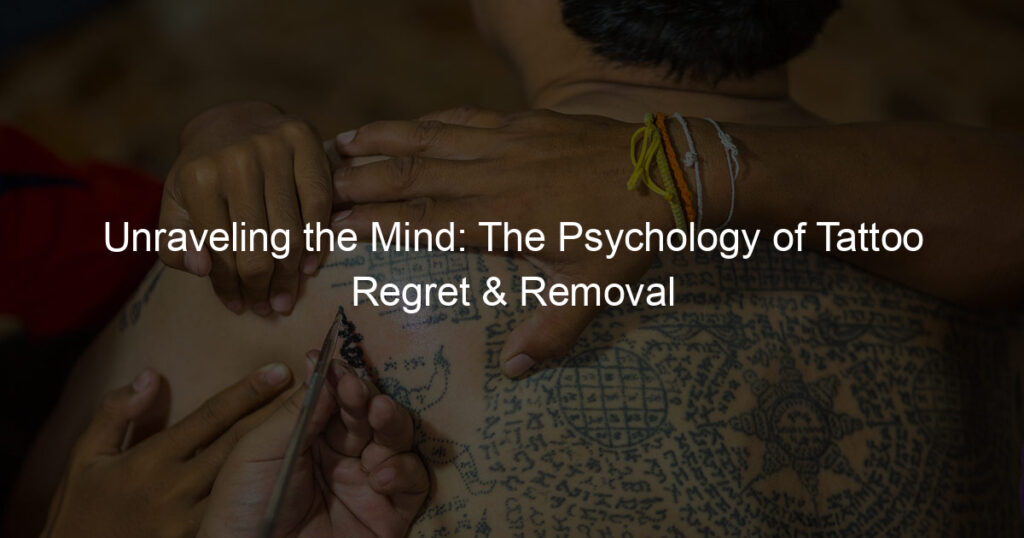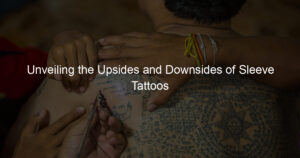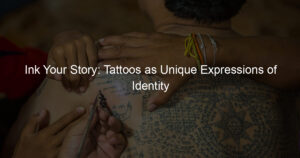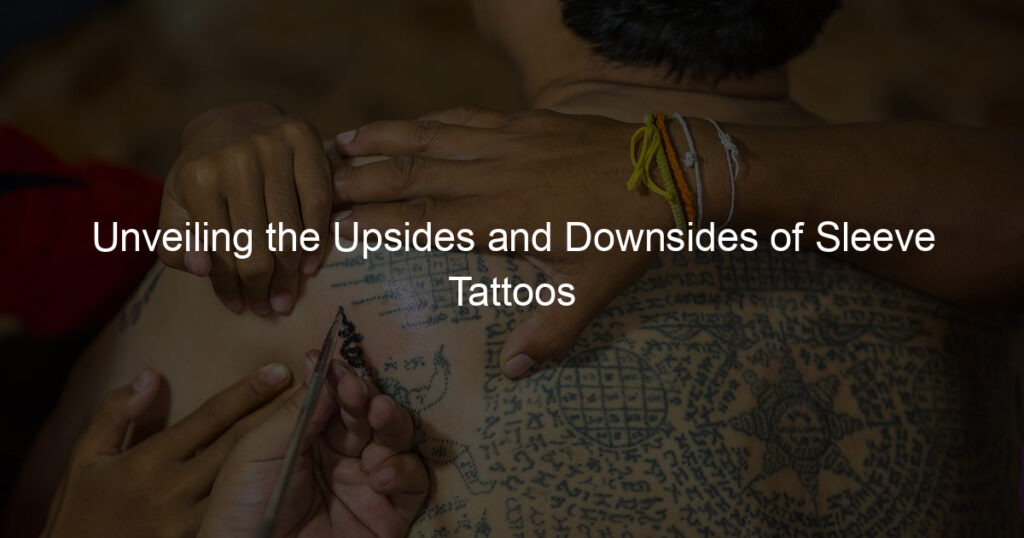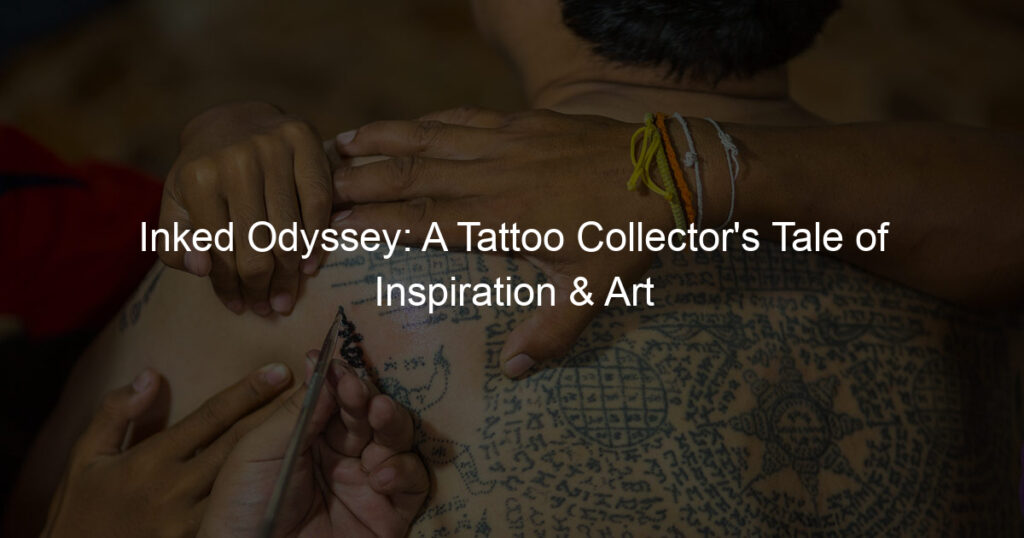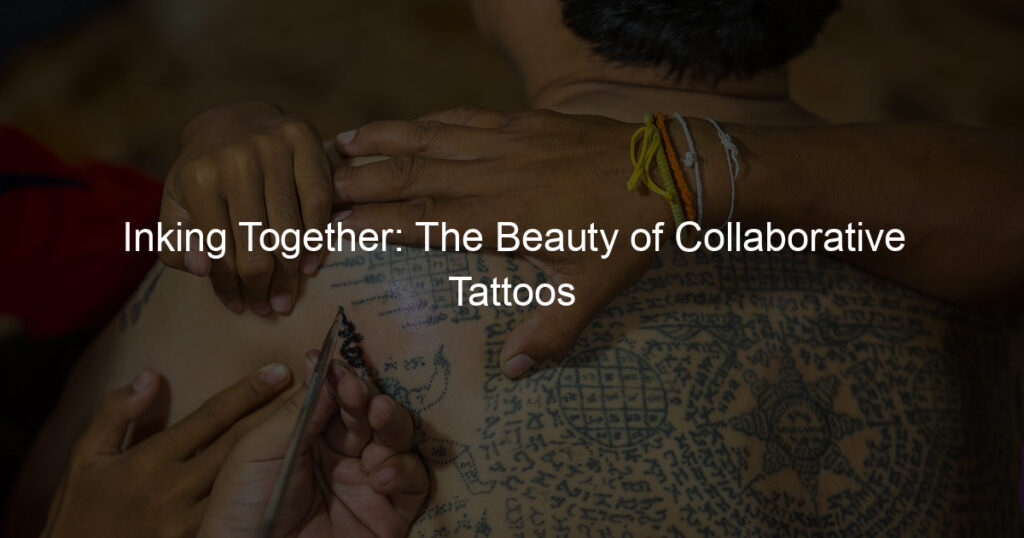
Introduction: Understanding Tattoo Regret
When it comes to tattoos, they are often seen as a form of self-expression, a way to commemorate a significant event or person, or simply a work of art on the body. However, not everyone who gets a tattoo remains happy with their decision. This is where the concept of tattoo regret comes into play.
Tattoo regret is a feeling of remorse or dissatisfaction that arises after getting a tattoo. It may occur immediately after getting inked, or it may develop over time as personal circumstances and attitudes change. It’s a sentiment that can lead to emotional distress and the desire for tattoo removal.
According to a survey conducted by the American Society for Dermatologic Surgery, nearly 23% of people with tattoos regret getting them. That’s almost one in four people! This statistic shows that tattoo regret is a common phenomenon and not an isolated experience.
There are many reasons why people experience tattoo regret. Some of the most common include poor tattoo quality, a change in personal beliefs or values, the end of a relationship symbolized by the tattoo, or the impact of the tattoo on professional opportunities. It’s important to note that the reasons for tattoo regret are as diverse as the individuals who experience it.
In the following sections, we will delve deeper into the psychology of tattoo regret, how to cope with it, and the process of tattoo removal. By understanding these aspects, we can better navigate the complexities of tattoo regret and make informed decisions about our body art.
The Psychology of Tattoo Regret
When we talk about tattoos, we often focus on the design, the artist, and the meaning behind the ink. However, there’s another side to the story that’s often overlooked – the psychology of tattoo regret.
Emotional Impact of Tattoo Regret
Regretting a tattoo can have a significant emotional impact. It can lead to a range of feelings and affect a person’s self-esteem. Let’s delve deeper into these aspects.
-
- Feelings of Regret and Shame
Regret is a common emotion associated with tattoo regret. It’s a feeling of sadness or disappointment over something that has happened or been done, especially when it involves a loss or a missed opportunity. In the case of tattoos, this could be a design that didn’t turn out as expected, a tattoo that no longer represents who you are, or a poorly thought-out decision made in the heat of the moment.
Along with regret, there can also be feelings of shame. This is particularly true if the tattoo is in a visible location or if it represents something that the person no longer identifies with. The constant reminder of the tattoo can lead to a cycle of shame and regret.
-
- Impact on Self-Esteem
Self-esteem is our overall sense of self-worth or personal value. It plays a crucial role in our mental well-being. Tattoo regret can negatively impact a person’s self-esteem, making them feel less confident or unhappy with their appearance. This can affect their interactions with others and their overall quality of life.
-
- Case Study: Personal Experiences of Tattoo Regret
Let’s look at a real-life example. Jane, a 35-year-old woman, got a tattoo when she was 18. The tattoo, which was a symbol of a band she loved at the time, is now a source of embarrassment for her. She no longer listens to the band and feels that the tattoo doesn’t represent who she is today. Jane’s story is a common one, highlighting how our tastes and identities can change over time, leading to tattoo regret.
In conclusion, the emotional impact of tattoo regret can be profound, affecting a person’s feelings, self-esteem, and overall mental well-being. It’s important to remember that it’s okay to feel regret and that there are options available for those who wish to remove or alter their tattoos.
Mental Health and Tattoo Regret
Understanding the connection between mental health and tattoo regret is crucial in comprehending the psychology of tattoo regret. Let’s delve into this topic and shed light on some key aspects.
-
- Link between mental health and tattoo regret
Research has shown a significant link between mental health and tattoo regret. Individuals who struggle with mental health issues, such as depression or anxiety, are often more likely to experience tattoo regret. This is because, during periods of emotional distress, people may make impulsive decisions, such as getting a tattoo, without fully considering the long-term implications.
-
- Role of impulsivity in tattoo regret
Impulsivity plays a significant role in tattoo regret. When people act on impulse, they tend to make decisions without thinking them through. In the case of tattoos, an impulsive decision can lead to a permanent mark that one may later regret. It is important to remember that tattoos are permanent and should not be a decision made lightly or impulsively.
-
- Case study: Mental health outcomes in individuals with tattoo regret
Consider the case of John, a 30-year-old man who got a tattoo during a period of emotional turmoil. John later regretted his decision, which led to feelings of embarrassment and shame. This regret further exacerbated his existing mental health issues, leading to a cycle of regret and poor mental health. This case study highlights the potential negative mental health outcomes associated with tattoo regret.
In conclusion, mental health and tattoo regret are closely linked. It is essential to consider one’s mental state before making a permanent decision like getting a tattoo. Impulsivity can lead to regret, which can further impact mental health. Remember, it’s okay to take your time when making such decisions, and it’s always okay to seek help if you’re struggling with tattoo regret.
Coping with Tattoo Regret
Dealing with tattoo regret can be a challenging process. However, there are several steps you can take to cope with this feeling. Here are three key strategies to help you manage your tattoo regret:
- Acceptance and Self-Forgiveness
It’s natural to feel regret after making a decision that you’re not happy with. However, it’s important to remember that everyone makes mistakes. Accepting that you made a decision that you now regret is the first step towards coping with tattoo regret. Self-forgiveness is also crucial. It’s okay to make mistakes, and it’s okay to change your mind. You are not alone in this; according to a survey, nearly 23% of people regret getting a tattoo.
- Seeking Professional Help
If your tattoo regret is causing you significant distress, it may be helpful to seek professional help. A therapist or counselor can provide you with strategies to cope with your feelings and can help you explore why you’re feeling regret. They can also help you develop a plan for moving forward.
- Considering Tattoo Removal
If your tattoo regret is severe, you may want to consider tattoo removal. This is a significant decision and not one to be taken lightly. It’s important to research the process thoroughly and understand the potential risks and benefits. According to a study, 11% of people with tattoos have had one removed or are considering removal.
| Strategy | Description |
|---|---|
| Acceptance and Self-Forgiveness | Accepting the decision and forgiving oneself for making a mistake. |
| Seeking Professional Help | Getting help from a therapist or counselor to cope with feelings of regret. |
| Considering Tattoo Removal | Researching and understanding the process of tattoo removal, considering the potential risks and benefits. |
In conclusion, coping with tattoo regret involves acceptance, seeking help, and considering removal if necessary. Remember, it’s okay to feel regret, and it’s okay to seek help. You’re not alone in this journey.
Understanding the Tattoo Removal Process
When it comes to removing a tattoo, it’s important to understand the different methods available. Each method has its own set of pros and cons, and the best choice will depend on factors such as the size, color, and location of the tattoo, as well as your personal preferences and budget.
Types of Tattoo Removal
There are three main types of tattoo removal: laser tattoo removal, surgical tattoo removal, and DIY tattoo removal methods.
-
- Laser Tattoo Removal
Laser tattoo removal is the most common method. It uses laser technology to break down the ink particles in the tattoo. The body’s immune system then naturally removes these particles. This method can require several sessions, but it’s generally effective and safe.
-
- Surgical Tattoo Removal
Surgical tattoo removal involves cutting out the tattooed skin and stitching the surrounding skin together. This method is often used for smaller tattoos. It’s more invasive than laser removal and can leave a scar, but it usually requires fewer sessions.
-
- DIY Tattoo Removal Methods
DIY tattoo removal methods include creams and at-home laser devices. These methods are less expensive than professional treatments, but they’re also less effective and can be risky. It’s always best to consult with a professional before trying a DIY method.
Remember, the process of removing a tattoo is not instant. It takes time, patience, and commitment. Always consult with a professional to determine the best method for you.
The Experience of Tattoo Removal
When it comes to tattoo removal, it’s not just about the procedure itself. It’s also about the experience – the physical, emotional, and personal aspects that come with it. Let’s delve into these aspects to give you a better understanding of what to expect.
-
- Physical aspects of tattoo removal
Tattoo removal is a process that involves breaking down the tattoo ink in your skin. This is usually done using laser technology, which emits high-intensity light beams to break the ink particles. The body’s immune system then flushes these particles out. This process can cause some discomfort, similar to the feeling of a rubber band being snapped against your skin. It’s important to note that everyone’s pain tolerance is different, so experiences may vary.
-
- Tattoo removal experiences
While the physical aspect is a significant part of the tattoo removal process, the emotional experience is equally important. Many people report feeling a sense of relief and freedom once their unwanted tattoo is removed. However, it’s also common to experience feelings of regret or sadness, especially if the tattoo had sentimental value. It’s crucial to prepare yourself emotionally for these potential feelings.
-
- Case study: Personal stories of tattoo removal
Let’s look at some real-life experiences to give you a clearer picture. One individual, John, had a large tattoo on his arm that he got in his early twenties. As he grew older, he felt the tattoo no longer represented who he was. The removal process was uncomfortable, but John says the end result was worth it. He now feels more confident and comfortable in his skin.
Another case is Mary, who had a small tattoo on her wrist. She decided to remove it for professional reasons. Mary found the process slightly painful but manageable with numbing cream. She felt a sense of relief once the tattoo was gone and felt it improved her professional image.
These experiences highlight the fact that tattoo removal is not just a physical process, but also an emotional journey. It’s important to be prepared for both aspects to navigate this journey successfully.
The Psychology of Tattoo Removal
When it comes to tattoo removal, it’s not just about the physical process. There’s a whole psychological aspect to it too. Let’s delve into the mind and explore the emotional journey that accompanies tattoo removal.
Psychological Effects of Tattoo Removal
Getting a tattoo removed can stir up a mix of emotions. Some people feel a sense of relief and satisfaction, while others may experience regret and disappointment. Let’s take a closer look at these feelings.
- Relief and satisfaction: Many people feel a sense of relief after getting a tattoo removed. This could be because the tattoo was a reminder of a past they wanted to forget or simply because they no longer liked the design. The satisfaction comes from finally being able to move on and start fresh.
- Regret and disappointment: On the other hand, some people may feel regret after removing a tattoo. They might miss the artwork or feel like they’ve lost a part of their identity. Disappointment can also set in if the removal process doesn’t meet their expectations, such as if the tattoo isn’t fully removed or if there’s scarring.
Now, let’s look at a real-life example to better understand these emotions.
- Case study: Emotional journey of tattoo removal
Meet Jane, a 30-year-old woman who decided to get her tattoo removed. Jane got her tattoo when she was 18, a symbol of rebellion and freedom. However, as she grew older, the tattoo no longer represented who she was.
The removal process was a rollercoaster of emotions for Jane. Initially, she felt relief and satisfaction. She was finally getting rid of a part of her past that no longer served her. But as the process continued, she also experienced moments of regret and disappointment. She missed the artwork and felt like she was losing a part of herself.
Despite these mixed feelings, Jane said she would still go through the process again. For her, the relief and satisfaction of moving on from her past outweighed the temporary feelings of regret and disappointment.
As we can see from Jane’s story, the psychological effects of tattoo removal can vary greatly from person to person. It’s a deeply personal journey that’s intertwined with one’s emotions and identity.
Mental Health and Tattoo Removal
When we talk about tattoo removal, it’s not just about the physical process. It also has a significant impact on a person’s mental health. Let’s delve into this topic.
-
Impact of Tattoo Removal on Mental Health
Removing a tattoo can be a liberating experience for many. It can help individuals move on from past mistakes or painful memories associated with the tattoo. According to a study, 72% of people reported feeling relief and satisfaction after their tattoo removal procedure. However, it’s important to note that the process can also be stressful due to the discomfort and multiple sessions required.
-
The Role of Expectations in Tattoo Removal Outcomes
Expectations play a crucial role in the tattoo removal process. If a person has realistic expectations about the procedure, they are more likely to feel satisfied with the results. On the other hand, if they expect the tattoo to disappear completely after one session, they might end up feeling disappointed. It’s essential for the tattoo removal specialist to communicate clearly about what can be achieved.
-
Case Study: Mental Health Improvements After Tattoo Removal
Let’s look at a case study. Jane, a 30-year-old woman, had a tattoo from her teenage years that she deeply regretted. It was a constant reminder of a time in her life she wanted to forget. After going through the tattoo removal process, Jane reported feeling a significant improvement in her mental health. She stated, “It’s like a weight has been lifted off my shoulders. I feel free and ready to move on.”
In conclusion, the psychological aspect of tattoo removal is as important as the physical process. It’s a journey that can lead to emotional relief and improved mental health, especially when expectations are managed correctly.
Conclusion: Unraveling the Mind in Tattoo Regret and Removal
As we wrap up our discussion on tattoo regret and removal, it’s important to reflect on the key insights we’ve gained. The journey of tattoo regret and removal is not just a physical one, but also an emotional and psychological journey that requires understanding and empathy.
-
- Key takeaways on the psychology of tattoo regret and removal
Firstly, tattoo regret is a common phenomenon, with studies showing that nearly 23% of individuals with tattoos experience regret. The reasons for this regret are varied, ranging from impulsive decisions, changes in personal beliefs, to the desire for a professional appearance. The process of tattoo removal, on the other hand, can be a liberating experience for many, but it’s also a process that requires patience and resilience, as it can take multiple sessions over a period of months to completely remove a tattoo.
-
- Importance of understanding the emotional and psychological aspects
Secondly, understanding the emotional and psychological aspects of tattoo regret and removal is crucial. Tattoo regret can lead to feelings of embarrassment, regret, and even depression. On the flip side, the process of tattoo removal can bring about feelings of relief and a sense of reclaiming one’s identity. It’s important for individuals going through this process to seek emotional support and professional help if needed.
-
- Final thoughts on coping with tattoo regret and considering removal
Lastly, coping with tattoo regret and considering removal is a personal journey that requires careful thought and consideration. It’s important to weigh the pros and cons, understand the process and potential risks, and seek professional advice. Remember, it’s okay to change your mind about a tattoo. What matters most is your comfort and happiness with your body.
In conclusion, the journey of tattoo regret and removal is a complex one that intertwines the physical, emotional, and psychological aspects of an individual’s life. By understanding these aspects, we can better support those going through this process and help them navigate their journey with empathy and understanding.

